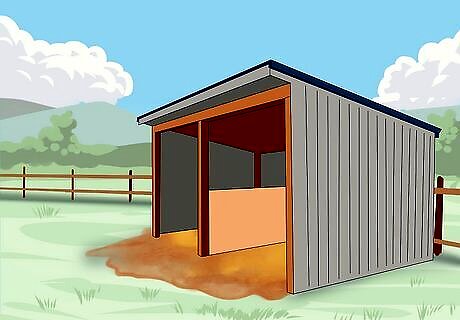
views
Learning About Horses and Their Care

Go to horseback riding camp. Make sure you really like horses before you ask your parents for one. Going to a horseback riding camp for a week in the summer gives you a chance to be around horses before you have one of your own. You’ll also learn how to ride and take care of the horses every day. Camp can be expensive, but some organizations like City to Saddle offer camp scholarships to new riders. Ask a teacher, or another adult you trust - maybe a favorite aunt or uncle or even your parents - to help you look for and apply for scholarships.

Volunteer at a barn. Most barns are happy to have free help from people who love horses. Contact your local barn and see if you can volunteer there. Volunteering not only gives you a chance to be around horses, it also gives you a chance to see how caring for horses really works. Make sure you have your parents' permission before you offer to volunteer. An adult your trust can help you find barns where you can volunteer. Some barns will let you exchange volunteer hours for riding lessons. See if that’s a possibility for your barn.

Choose a horse that’s good for new riders. There are so many horse breeds out there that it can feel overwhelming to choose one. An older or schoolmaster horse that has lots of experience is the best option if you're a new rider. You should also choose a horse based on size – a smaller pony is best if you’re on the short side. Your instructor or a horse camp counselor can help you choose the actual breed of your horse. It will depend a lot on your personality, how much experience you have, and how often you’ll ride.

Figure out where your horse will live. If you have your own land, your horse can live on your land. It will need a sturdy shelter - with 3 walls and a roof - big enough for it to stand up in. You’ll also need an acre of fenced land for your horse to graze and exercise in. Pick a place on your property where you think these things could be built to talk over with your parents. Building the right fence can cost a lot of money. It needs to be sturdy enough to keep your horse in and long enough to enclose the full acre. Make sure you're ready to talk about that with your parents.

Find a few other places to house your horse if you don't have space at home. Depending on where you live, there might be a lot of barns around you, or only a few. Research 2 to 3. You’ll need to know how much boarding costs each month and what it includes. Look for a barn with a good reputation, and with a staff that seems friendly and qualified. You can ask an adult you trust - like a teacher or a counselor from horse camp - to help you find some good options. The cost of having your horse live at someone else's barn depends on good the barn is. The quality of the staff and grounds, as well as the barn's reputation will all affect the price of keeping your horse there.
Demonstrating Responsibility

Create a schedule for the responsibilities you have already. Horses can be a big time commitment, so you'll have to be responsible to take care of one. You probably have a list of chores you’re responsible for, on top of your own schoolwork. Create a weekly schedule for yourself that includes each of your chores, time for homework, and your other extracurricular activities. This will show your parents you can schedule your time well and that you can handle another responsibility. The best time to get a horse is after four years of horseback riding experience, Of course it doesn't have to be that long, whenever you and your parents think you have had plenty of experience. You can use a desk calendar, a phone app, or even just a notebook to create your schedule. Color-coding your schedule might help. Pick 1 color for homework, 1 color for chores, and another color for extra-curricular activities. This helps you see how much time you have left over in the week. Track your chores by assigning each chore a day of the week. So your schedule might look something like this: "Monday - clean room. Tuesday - do dinner dishes. Wednesday - take out trash. Thursday - clean room. Friday - help with laundry."

Make sure you’re completing your schoolwork on time. The best way to do this is to have a set time for when you do your homework. Maybe you like doing it as soon as you get home from school. Maybe you prefer to do it after dinner. Either way, make sure you’re doing your homework every day and turning it in on time. This shows your parents having a horse won’t interfere with school.

Consider getting an after-school job if you're old enough. Ask your parents for permission first, and look for an after-school job that can help you make some extra money. When your parents realize you took the job to help pay for your horse, they’ll see you were thinking ahead and taking on extra responsibility. The legal age you can begin working varies from place to place, but 15 is a pretty common age. If you're under 16 or 18, you might need your parents' permission. You can check with your school to see what the requirements are where you live. If you're not old enough to get an after-school job, there are other ways for you to make some extra money! You can try babysitting, picking up more chores at home for extra allowance (if your parents agree).

Avoiding whining or picking fights. Getting a horse is a huge responsibility, and your parents will probably want to see that you're grown up enough to handle it. Don’t whine when your parents tell you no about something, and avoid picking fights with your siblings. If you can show your parents that you’re mature and responsible, they might be more likely to agree you’re ready for a horse.
Talking to Your Parents

Get ready to talk to your parents. Before you even ask your parents to talk to them, you have to know what you want to say. Write down what you want to say to your parents. You can include why you want a horse, the ways you've shown you're ready for more responsibility, and whatever you've done to have some extra money for your horse.

Ask your parents if you can talk to them. Tell your parents you wan to talk to them about something important. Ask them to pick a time when no one is distracted and you have plenty of time - after dinner might work well.

Explain that you know that getting a horse is a big commitment. Starting your chat this way tells your parents you've thought a lot about getting a horse. It also shows them you've spent a long time thinking about it. Ask your parents what concerns they have about you getting a horse.

Suggest that you and your parents agree on money ahead of time. Ask your parents if they’d be willing to split the cost of owning a horse with you. You can offer to pay for the horse’s accessories – bridle, brushes, and things – if they’ll pay for the horse and its stabling costs. You can even write up a simple sample contract to show your parents how serious you are. Your contract can say something as simple as "I [enter your name] agree to use my allowance to buy the bridle, saddle, and brushes for my horse. Mom and Dad agree to buy me the horse and pay for its housing as long as I keep up with my other responsibilities." If you’re willing, tell your parents that you’ll consider your horse and the cost of caring for it your gifts for the foreseeable future. You can also write into the agreement that you’re willing to take on an after-school job to pay for your portion of the horse.

Remind them that having a horse can keep you healthy. Tell your parents that horse-riding will mean you have to do a lot of physical stuff, and that it can be great for your overall health.

Ask them to consider what you’ve said overnight. Your parents might be a little overwhelmed by your request for a horse. Once you’ve finished laying out your argument, tell them you hope they’ll consider it at least overnight. If they need more time than that, be patient.




















Comments
0 comment